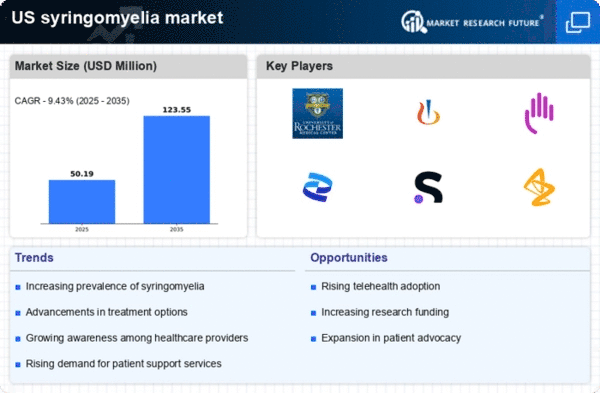Rising Incidence of Syringomyelia
The increasing incidence of syringomyelia in the US is a notable driver for the syringomyelia market. Recent studies indicate that the prevalence of this condition is rising, with estimates suggesting that it affects approximately 8 out of every 100,000 individuals. This growing patient population necessitates enhanced treatment options and healthcare services, thereby stimulating market growth. As more individuals are diagnosed, the demand for specialized medical care, including surgical interventions and ongoing management, is likely to increase. This trend may lead to a surge in investments directed towards the development of innovative therapies and technologies aimed at addressing the unique challenges posed by syringomyelia. Consequently, the rising incidence of this condition is expected to significantly impact the dynamics of the syringomyelia market in the coming years.
Advancements in Diagnostic Techniques
Advancements in diagnostic techniques are playing a crucial role in shaping the syringomyelia market. Enhanced imaging technologies, such as MRI and CT scans, have improved the accuracy of syringomyelia diagnoses, allowing for earlier detection and intervention. This is particularly important as timely diagnosis can lead to better patient outcomes and more effective treatment strategies. The increased availability of these advanced diagnostic tools is likely to drive demand within the market, as healthcare providers seek to offer the best possible care to their patients. Furthermore, as awareness of syringomyelia grows among healthcare professionals, the utilization of these diagnostic techniques is expected to rise, further propelling the market forward. The integration of innovative diagnostic methods is thus a significant factor influencing the syringomyelia market.
Rising Demand for Personalized Medicine
The rising demand for personalized medicine is significantly influencing the syringomyelia market. Patients and healthcare providers are increasingly seeking tailored treatment approaches that consider individual patient characteristics, including genetic factors and specific disease manifestations. This shift towards personalized medicine is prompting pharmaceutical companies to invest in the development of targeted therapies that can provide more effective and individualized treatment options for syringomyelia. As a result, the market is likely to see a growing array of therapies designed to meet the unique needs of patients. Additionally, advancements in genetic research and biomarker identification are expected to further enhance the potential for personalized treatment strategies. The emphasis on personalized medicine is thus a key driver shaping the future of the syringomyelia market.
Increased Collaboration Among Stakeholders
Increased collaboration among stakeholders in the healthcare sector is emerging as a vital driver for the syringomyelia market. Partnerships between pharmaceutical companies, academic institutions, and healthcare providers are fostering a more integrated approach to addressing the challenges associated with syringomyelia. These collaborations often lead to shared resources, knowledge exchange, and joint research initiatives, which can enhance the development of effective treatment options. Furthermore, such partnerships may facilitate clinical trials and expedite the approval process for new therapies. As stakeholders recognize the importance of working together to tackle this complex condition, the resulting synergy is likely to propel advancements in the syringomyelia market. This collaborative spirit is essential for driving innovation and improving patient care.
Growing Investment in Research and Development
The syringomyelia market is experiencing a surge in investment directed towards research and development initiatives. Pharmaceutical companies and research institutions are increasingly focusing on developing novel therapies and treatment modalities for syringomyelia. This trend is driven by the need for more effective and targeted treatment options, as existing therapies may not adequately address the complexities of the condition. In recent years, funding for research in this area has seen a notable increase, with estimates suggesting that R&D expenditures could reach upwards of $500 million annually. This influx of capital is likely to foster innovation and accelerate the development of new drugs and treatment protocols, ultimately benefiting patients and healthcare providers alike. The commitment to advancing research in syringomyelia is thus a pivotal driver of the market.
















